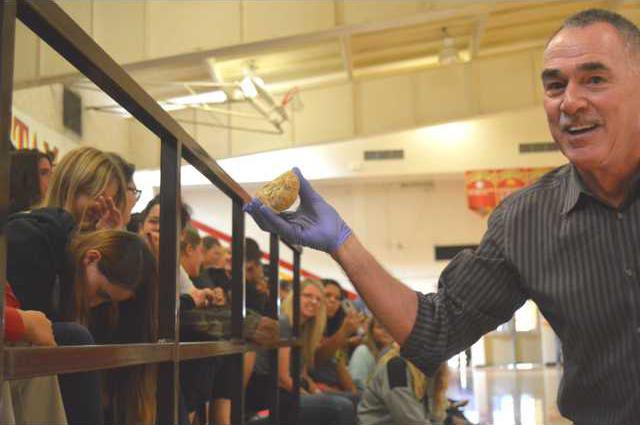Even if you’ve never smoked in your life, it’s still breathtaking to hear Victor DeNoble’s story about taking on the multi-billion dollar tobacco industry. His story sounds like a good spy novel; thick black covered windows, rat murders, betrayal and FBI debriefing in an underground warehouse.
This was the tale Oakdale High School freshmen were privy to last week, as Dr. DeNoble made a visit to the campus to share his story with the Class of 2019.
“We chose freshmen because it ties into our Freshman Health requirement,” OHS Vice Principal Shannon Kettering said of the speaking appearance. “A portion of the freshman health class is dedicated to learning about the mechanism of addiction and the impact of addiction physically, emotionally, socially and financially. This presentation fit in beautifully with the health curriculum.”
DeNoble visited a number of Stanislaus County schools over the last week during a five-day speaking engagement on cigarettes and nicotine.
“Dr. DeNoble was sponsored by our site PHAST (Promoting Health And Slamming Tobacco) Club and paid for through the Stanislaus County Office of Education TUPE (Tobacco Use Prevention Education) grant,” Kettering said. “OHS receives funds to support cessation and prevention education activities and education through our PHAST club here on campus.”
Now a national speaker, it is the scientist’s past, as well as findings which serve as his topic of interest during his speaking engagements. DeNoble was hired in 1980 by Phillip Morris at the age of 26. As a behavioral scientist specializing in addiction, his job was to develop a no-nicotine cigarette that was still tasty and addictive, but wouldn’t cause the heart and stroke deaths like nicotine does.
He studied the effects of nicotine on the brain and succeeded in developing a nicotine substitute that did not have negative effects that nicotine has on the heart. Phillip Morris, fearing that his research would support the claims that nicotine was addictive, seized his laboratory and he was fired.
In 1994 he became the first “whistle-blower” to begin tearing down the wall of secrecy built by the tobacco industry. He shared what life was like working behind the black windows of the third floor in a lab of secrecy with the students.
“Most importantly I would tell Congress under oath,” Dr. DeNoble highlighted of his 1994 testimony, “I discovered nicotine changes the way a rat’s brain works while I worked inside a tobacco company.”
The speaker shared with the students his extensive work with rats, as well as monkeys including one monkey in particular, Sara who would try anything drug related, even cigarettes. He also noted that only one animal will return to cigarette use when given the opportunity … humans.
“I want you to think about it,” he said. “When a person uses a cigarette, cigar, chew tobacco, a hookah, electronic cigarette, where does the nicotine go? It goes into your blood. Once a drug is in your blood, it enters your brain.”
Dr. DeNoble educated the students via a compelling story, as well as slide presentation and physical samples of rat and monkey brains. He touched on the long term effects of heroin, supported by mouse study as well as human observation. He then shared how the same tests used in heroin testing would be applied with nicotine. A switch the rat would step on and result in a nicotine injection.
“It took my rats 30 days, to addict their brain to nicotine,” he shared. “In 30 days my rats, they were stepping on that switch over 90 times every day. That’s the equivalent of a person smoking a pack of cigarettes each day.”
The scientist explained to the students the complexity of the human brain, highlighting the fact that every human brain contains an area that can get addicted to drugs. Noting the fact that with the brain, one cannot feel a change, yet it occurs.
“You don’t know when you’re learning something, but you do know when you’ve learned it,” he said. “You will not know when you’re getting addicted to a drug either. You’ll only know when you are addicted to that drug.”
“Through his experiences, Mr. DeNoble is able to take the very complex physiological process of addiction and present it in a clear and entertaining manner,” the vice-principal said of the value of DeNoble’s presentation. “Not only that, but he shares how the tobacco industry fought to hide the truth about nicotine addiction with an insight that only a former tobacco industry scientist could.”
DeNoble has been featured on shows such as “60 Minutes” and “Dateline NBC” as well as a documentary, “Addiction Incorporated” which was completed in 2011.





